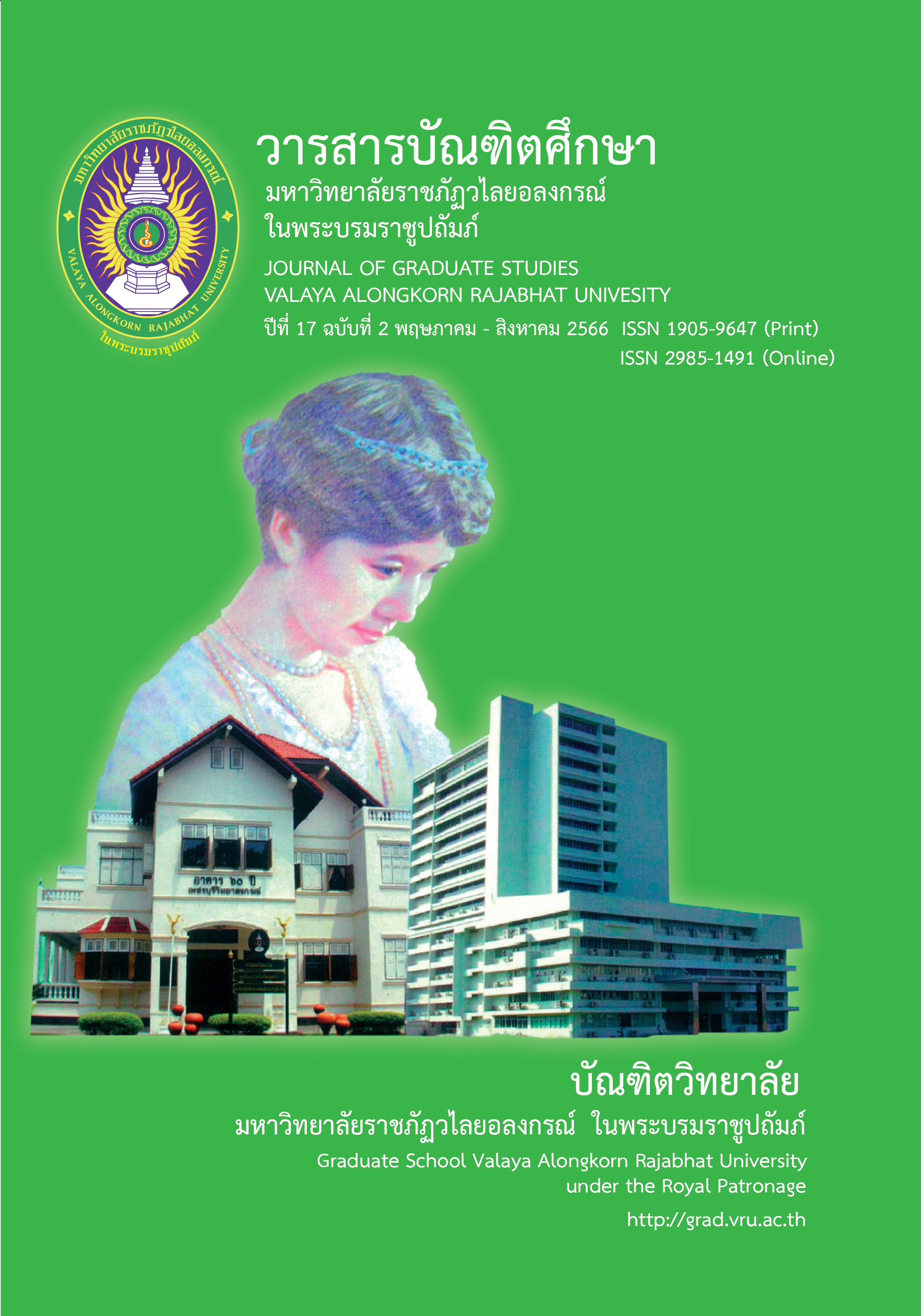THE DEVELOPING LEARNING MATERIALS TO STIMULATE LEARNING FOR LEARNERS THROUGH REALITY TV PROGRAMS
Main Article Content
Abstract
The purposes of this research were to 1) developing learning materials to stimulate learning for learners through reality TV programs, 2) assess learning materials to stimulate learning of learners through reality TV, 3) compare students' Student's t-test scores through reality TV programs, and 4) study students' satisfaction with learning through reality TV programs. The sample group used in the research were 15 third-year students enrolled in the radio and television advertising program. The research instrument was a learning media based on a reality TV program of 11 episodes, media assessment form, pre-test / post-test, satisfaction assessment form. The statistics used in the data analysis were mean, percentage, standard deviation and t-test, independent testing.
The results were as; 1) The efficiency of the developing learning materials to stimulate learning for learners through reality TV programs for studying in radio and television script writing. The acceptable criterion was that the Effectiveness Index was valued at 0.50 or higher, which the score of the Effectiveness Index was = 0.5175, resulting in passing the criteria. 2) The media assessment results Learning to stimulate learners' learning through reality TV with the value = 0.93, the value is between 0.67 – 1, and the consistency index is not less than 0.50 is considered a media. 3) The Pre- and post-study test scores of students through reality TV statistically significant at the 0.05 level (p = 0.00, t = 21.77) and 4) The results of the analysis of students' satisfaction with online lessons revealed that the students' satisfaction with learning was at the highest level, with mean = 4.51 and standard deviation = 0.54.
Article Details

This work is licensed under a Creative Commons Attribution-NonCommercial-NoDerivatives 4.0 International License.
บทความทุกเรื่องได้รับการตรวจความถูกต้องทางวิชาการโดยผู้ทรงคุณวุฒิ ทรรศนะและข้อคิดเห็นในบทความ Journal of Global of Perspectives in Humanities and Social Sciences (J-GPHSS) มิใช่เป็นทรรศนะและความคิดของผู้จัดทำจึงมิใช่ความรับผิดชอบของบัณฑิตวิทยาลัย มหาวิทยาลัยราชภัฏวไลยอลงกรณ์ ในพระบรมราชูปถัมภ์ กองบรรณาธิการไม่สงวนสิทธิ์การคัดลอก แต่ให้อ้างอิงแหล่งที่มา
References
Feltwell, T., Wood, G., Rowland, S., Long, K. S., Elsden, C., Brooker, P., & Lawson, S. (2019). Designing Second-Screening Experiences for Social Co-Selection and Critical Co-Viewing of Reality TV. Paper presented at the Proceedings of the 2019 CHI Conference on Human Factors in Computing Systems.
Gleason, B., & Von Gillern, S. (2018). Digital citizenship with social media: Participatory practices of teaching and learning in secondary education. Journal of Educational Technology & Society. 21(1), 200-212.
Hwang, D. C., Arora, A., Goldstein, D. S., Yang, S. C., & Story Jr, G. A. (2017). Managing related digital content. In: Google Patents.
Jarusawat, P. (2020). kānsưksā khwāmphưngphō̜čhai nai kānsō̜n wichākān rū sārasonthēt dūai withī kān rīan bǣp mī sūan rūam læ kānsō̜n bǣp rūammư̄ phư̄a phatthanā thaksa hǣng satawat thī 21 [Students’ satisfaction of the information literacy course using the collaborative learning and collaborative teaching approaches to enhance the 21st century skills]. Journal of Human Sciences. 21(3), 43-62.
Jitsangworn, W. (2019). kānphatthanā botrīan ʻō̜nlai rư̄ang lak samkhan khō̜ng theknōlōyī sārasonthēt samrap naksưksā parinyā trī Khana Witthayāsāt læ Thēknōlōyī mahāwitthayālai rātchaphat Thon Burī [Development of online lesson on principle of information technology for undergraduate students, Faculty of Science and Technology, Dhonburi Rajabhat University]. Dhonburi Rajabhat University Journal. 13(2), 92-104.
Junkorn, A., Palwisut, P., Rodjan, M. & Muangpool, T. (2020). kānphatthanā rabop sanapsanun kān tatsinčhai samrap khonsong phalittaphon thāngkān kasēt sū talāt chumchon dōi chai withīkān chœ̄ng phanthukam [The development of decision support systems for transporting agricultural produce to local market using genetic algorithm]. Journal of Applied Information Technology. 6(1), 29-37.
Nontapa, N. (2022). kānphatthanā krabūankān čhatkān rīanrū dōi ʻong chœ̄ng khanittasāt tām thritsadī kānrīanrū khō̜ngwaikō̜tsakī thī mī kān chūai sœ̄m samatthana phư̄a songsœ̄m manō that thāng khanittasāt khō̜ng nakrīan thī mī phon samrit thāngkān rīan tam [A development of learning management process using mathematics stories based on Vygotsky’s theory with scaffolding to enhance mathematics concepts of low achievement students]. Journal of Graduate Studies Valaya Alongkorn Rajabhat University. 16(2), 112-122.
Phramaha Chaichana Buddhameedee (Kiram), (2020). kānčhat kitčhakam songsœ̄m kānrīanrū nai yuk thailǣn sī. sū 4.0 [Organizing activities promote learning in the Thailand 4.0]. Journal of Teaching Social Studies. 2(01), 133-148.
Sethakul, P., & Utakrit, N. (2019). Challenges and future trends for Thai education: conceptual framework into action. International journal of Engineering Pedagogy. 9(2), 8-16.
Wongkongdech, R., Wongkongdech, A. & Goolprom, W. (2018). phrưttikam kānchai sư̄ khō̜ng dek yuk satawat thī yīsipʻet [Social media using skill of child in 21st centuries]. Nakhon Lampang Buddhist’s Journal. 7(2), 26-36.
Wongthong, P. & Thaksin, S. (2022). kānsưksā khwām phrō̜m phrưttikam kānrīanrū læ khwāmphưngphō̜čhai khō̜ng nakrīan radap chan matthayommasưksā rōngrīan sāthit Mahāwitthayālai Sīnakharinwirōt ʻongkharak thī mī tō̜ kānčhatkān rīanrū nai chūang kān phrǣ rabāt khō̜ng rōk khō wit-19 [A study of the readiness, learning behavior and satisfaction of high school students of Ongkarak Demonstration School Srinakharinwirot University towards online learning management during covid-19 outbreak]. Journal of Humanities and Social Sciences Nakhon Phanom University. 12(2), 166-180.


